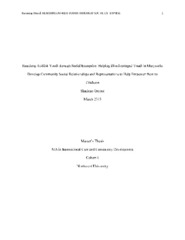| dc.contributor.author | Greene, Sharlene | en |
| dc.date.accessioned | 2017-08-02T16:39:33Z | |
| dc.date.available | 2017-08-02T16:39:33Z | |
| dc.date.issued | 2015-03 | en |
| dc.identifier.uri | archives.northwestu.edu/handle/nu/25160 | |
| dc.description.abstract | Through interviews and literature reviews, this study undertook to understand components necessary to support youth at risk for not graduating high school, to help build individual capacity, and to better position these youth for success. The city of Marysville, Washington, has experienced a huge population growth which, for my study's purposes, specifically includes high school students from every ethnic category on the Census (Hess et al, 2012). While the diversity may seem good, each ethnic/racial category also represents a different history of marred racial relationships. Although laws have been passed to protect minority populations, for decades, even centuries, these ethnic group members have experienced negative interactions with the U.S. dominant white culture, and these experiences have decidedly weakened these relationships. Local efforts to build specific values and principles into interactions between leaders in the community and struggling high school students of ethnic and racial minority can work to strengthen and empower them for academic and economic success. It is also essential for Marysville citizens of all races to support and sustain healthy interactions and community development, and to identify and resolve those that hinder and degrade positive personal and community development. Toward that goal, my study proposes a coffee shop social enterprise study that connects at-risk (for not graduating high school) Marysville students with local, ethnic business leaders to create a work experience that hopes to educate, support and empower these students in ways toward a productive future. | en |
| dc.description.tableofcontents | Values/principles. Social capital; Social representation; Culturally responsive; Social inclusion; Social justice; Asset-based -- Context. What is education; Why is education important; What's impacting graduation rates -- Business model. Purpose; Key partnerships; Key activities; Key resources; Value proposition; Customer relationships - How to retain customers; Channels - How to attract customers; Customer segments - Who are potential customers; Cost structure; Revenue streams; Conclusion | en |
| dc.format.extent | 56 pages | en |
| dc.format.medium | DOCX | en |
| dc.language.iso | en | en |
| dc.publisher | Northwest University | en |
| dc.rights | This original work is protected by copyright. Copyright is retained by the author(s). Works may be viewed, downloaded, or printed, but not reproduced or distributed without author(s) permission. | en |
| dc.rights.uri | http://archives.northwestu.edu/page/copyright | en |
| dc.subject | Problem youth | en |
| dc.subject | Minorities | en |
| dc.subject | Community development | en |
| dc.subject | Education | en |
| dc.title | Reaching At-Risk Youth through Social Enterprise: Helping Disadvantaged Youth in Marysville Develop Community Social Relationships and Representations to Help Empower them to Graduate | en |
| thesis.degree.name | Master of Arts in International Care and Community Development | en |
| thesis.degree.level | Masters | en |
| thesis.degree.grantor | Northwest University | en |
| thesis.degree.discipline | College of Social and Behavioral Sciences | en |


 Maintained by the Northwest University Library
Maintained by the Northwest University Library